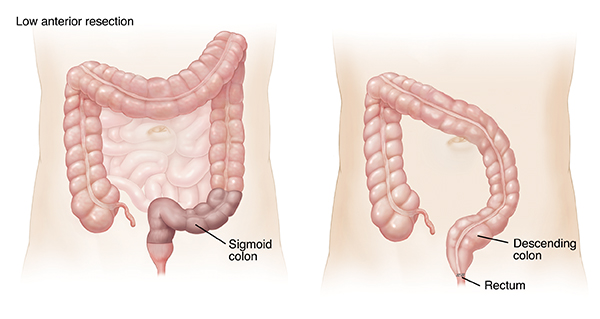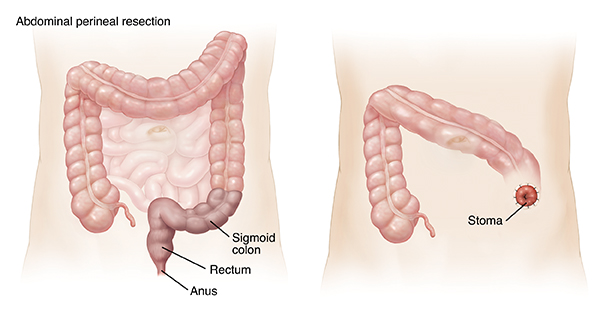During rectal surgery, the rectum is surgically taken out. You'll be given instructions on how to get ready for your surgery. Follow these instructions carefully. Ask questions if something is unclear. You'll likely be admitted to the hospital on the day of your surgery. In certain cases, you may need to be at the hospital the day before.
Getting ready a few weeks before surgery
To get ready for the surgery:
-
Have a thorough physical exam as instructed by your healthcare provider.
-
Tell your surgeon about all the medicines you take, and ask if you should stop taking them. This includes:
-
Prescription and over-the-counter medicines
-
Aspirin
-
Nonsteroidal anti-inflammatory drugs (NSAIDs)
-
Blood thinners, such as warfarin
-
Vitamins, herbs, or other supplements
-
-
Quit smoking. Smoking raises surgery risks. It also slows healing.
-
Tell your provider if you drink alcohol regularly, and how much.
Getting ready the day before surgery
Follow any directions you're given for taking medicines and for not eating or drinking before surgery. Do a bowel prep if instructed. You may be asked to wash with a special scrub.
The day of surgery
When you arrive at the hospital, you'll be asked to fill out certain forms. You'll then change into a gown. An IV (intravenous) line will be put into your arm. This gives fluids and medicines. You’ll meet with your anesthesiologist or nurse anesthetist to talk about the medicine (anesthesia) that helps you sleep during surgery. Ask any questions you have at this time. Before surgery starts, you’ll be given general anesthesia to put you into a deep sleep. A soft tube called a catheter may be placed into your bladder to drain urine.
During your surgery
What to expect during your surgery:
-
Your surgery may be done through 1 cut (incision) in your belly (abdomen). This is called open surgery. The cut may be several inches long. Or the surgery may be done laparoscopically. This means the surgeon makes several small cuts. A thin telescope-like tube with a camera (laparoscope) is then placed into 1 of the small cuts. This lets your healthcare provider view the surgery on a video screen and operate through the small cuts.
-
Part or all of the rectum is removed (resected). Part or all of the sigmoid colon may also be taken out. The anus may be taken out as well.
-
If some of the rectum or anus remains, the colon may be reconnected to it. This is called an anastomosis.
-
If the rectum and anus are removed, a colostomy is done. This makes a new opening in the belly so waste can leave the body.
-
Once surgery is done, you’ll be taken to the postanesthesia care unit (PACU) to be watched closely. Once you're awake and stable you'll be taken to your hospital room.
Types of rectal resection
Below are the 2 types of rectal surgery. Your healthcare provider can talk about these with you.
Low anterior resection. The sigmoid colon and a part of the rectum are removed. The descending colon is reconnected to the remaining rectum.
Abdominal perineal resection. Part or all of the sigmoid colon and the entire rectum and anus are removed. A colostomy is then done.
If you have a colostomy
During a colostomy, part of the colon is connected to an opening in the belly wall. This new opening is called a stoma. This is where stool now leaves the body. Stool passes through the stoma into a special bag or appliance. Your healthcare team will help you learn how to care for your stoma. Having a colostomy can seem overwhelming. But you'll have lots of support. In time, caring for your stoma will become part of your daily routine.
Risks and possible complications
Risks and possible complications of rectal surgery are:
-
Infection
-
Injury to nearby organs, such as the kidneys
-
Leaking or separation of anastomosis
-
Blood clots
-
Internal bleeding
-
A pus-filled infection (abscess) forms
-
Scar tissue (adhesions) or bowel blockage
-
Risks of anesthesia
Featured in



